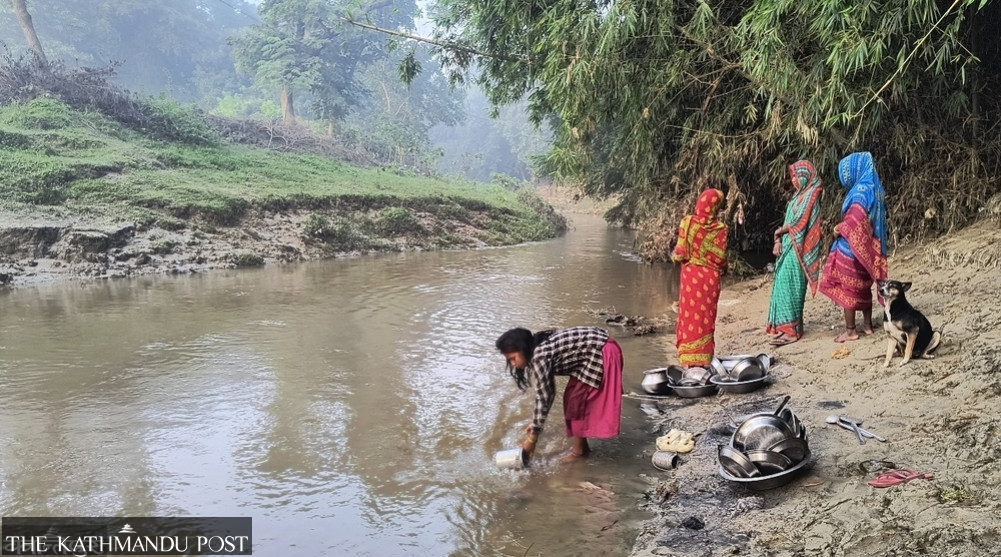National
Musahar settlement cholera traced to ponds, and local stream
Two children and an elderly died of the disease in Sadatol of Saptari two weeks ago. Residents complain of lack of money for treatment.
Bidyananda Ram
In Sadatol of ward 5 in Chhinnamasta Rural Municipality, three people, including two children, have died of diarrhoeal infections suspected to be caused by cholera. A one-year-old boy, a four-year-old girl and a 70-year-old man succumbed to the deadly disease in the rural municipality two weeks ago. Many others have taken ill in the impoverished settlement where sanitation, public health awareness and healthcare remain severely lacking.
Tests conducted on nine suspected patients confirmed cholera in five, said local health authorities. Around 90 households in the settlement, a predominantly Musahar community, depend on three hand pumps for daily water needs, but none of the homes have a toilet. The Musahar are historically marginalised and among the poorest in the Tarai.
Cholera is a highly infectious disease that causes severe diarrhoea and vomiting, which can lead to dehydration and death within a few hours if left untreated.
“When we tested water samples from the hand pumps, nearby ponds, and the Bhaluwahi stream, cholera bacteria were detected in the pond and stream water,” said Dipendra Prasad Yadav, chief of the rural municipality’s health unit. “We have urged locals not to use this water for washing utensils or bathing. About 20 volunteers have been mobilised for public awareness,” he added, noting that most patients were recovering and the situation was under control.
However, locals say the real problem runs deeper than the disease itself. “We worry more about hunger than cholera,” said daily wage earner Shiva Narayan Sada, a resident of the Dalit settlement where two more villagers have fallen ill. His mother, 62-year-old Samtoliya Devi, has been bedridden for four years after partial paralysis. “We sold everything for her treatment once, but we couldn’t afford to continue,” he said, his voice breaking. “We just pray she survives. We have no money left for doctors or medicines.”
Five years ago, Shiva Narayan and his elder brother Shankar had returned from Punjab, India, after saving Rs17,000 to treat their mother. They spent it all on her recovery in Bihar’s Kharaia town, leaving the family without food for days. “For three days, we didn’t even light the kitchen fire,” he recalled. “Now, all our earnings go to food and medicine, but her condition is worsening again.”

Yadav said the municipality is working with the provincial public health laboratory in Janakpur to trace the disease’s source and distribute purification tablets, but logistical constraints and lack of awareness have slowed efforts. “Safe water and sanitation remain serious challenges in these marginalised settlements,” he said.
Various study reports show that cholera outbreaks in Nepal’s southern plains are often linked to unsafe water sources, open defecation and delayed government response. In 2022, cholera spread to several Tarai districts, including Saptari, after heavy rains contaminated surface water, killing multiple people and hospitalising hundreds.
Earlier this year, at least four people died of cholera, and over 1,800 others have been hospitalised in Bara and Parsa districts since the first week of August.
In Sadatol, the outbreak has once again exposed the grim intersection of disease and deprivation. Most villagers survive on daily wages from agricultural labour or migration to Indian cities like Punjab and Mumbai. Basic healthcare is distant, sanitation facilities nonexistent, and education neglected. “Almost no child here goes to school. Many marry before they are 16, and once married, they take on adult responsibilities and leave for India to earn,” said Jaya Prakash Thakur, ward 5 chairman of Chhinnamasta Rural Municipality.
Most of the children of this settlement have not been enrolled in school due to the absence of birth certificates and because their parents don’t have citizenship certificates in the first place. Some do not go to school because of poverty.
Thakur said deep-rooted poverty and social habits have hindered progress. “They work hard all day but spend their earnings on alcohol instead of hygiene and children’s education,” he said. “We try to change this behaviour, but it’s very difficult when generations have lived the same way.”
Locals, however, say that they are aware of the risk but helpless in the face of poverty. “We know the water is unsafe,” said a mother of three, washing dishes beside the stream. “But what can we do? We have no other source.”
As health officials continue efforts to contain the outbreak, Sadatol stands as a stark reminder of how preventable diseases like cholera persist when inequality, neglect, and poverty intertwine.




 12.62°C Kathmandu
12.62°C Kathmandu














